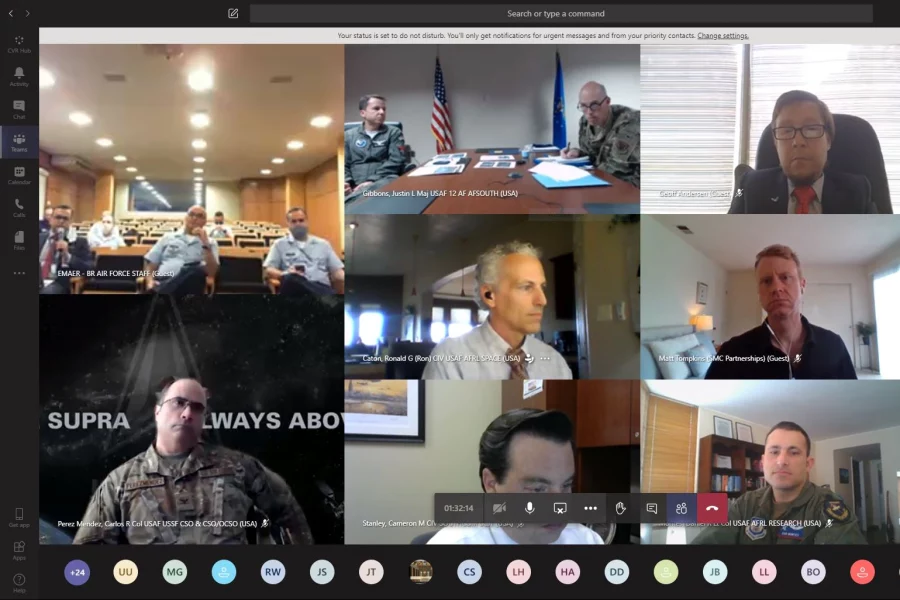U.S. SOUTHERN COMMAND, Miami, Fla.—U.S. Southern Command is planning to expand its military space engagement in the Americas to help partner nations in ways China and Russia don’t, in part by combating crime from drug trafficking to deforestation and illegal fishing.
“We are going to stand up a more robust space team that will allow us to then work with Space Command and the Space Force to bring more capability to our partner nations,” Lt. Gen. Andrew Croft, military deputy commander of U.S. Southern Command, said in an interview.
“We’re going to have a southern space component for SOUTHCOM here in about a year,” he said. “The Russians and the Chinese are competing with us in that realm. So, they have space observatories also in our AOR [area of responsibility].”
The former commander of SOUTHCOM’s Air Forces Southern at Davis-Monthan Air Force Base, Ariz., said sharing space domain awareness information with partner nations is currently conducted under the component command position he occupied from 2018 to 2020.
Now, he envisions expanding personnel to a small team at the Miami combatant command headquarters, mirroring the way cyber capabilities and partner engagement have grown in recent years. SOUTHCOM would grow the team of planners and trainers to “less than 10” at first.
“I think it’ll grow slowly over time as we do more space operations here in the AOR,” Croft said.
Few countries in the Western Hemisphere have space capabilities, but many benefit from the sharing of open-source satellite data. SOUTHCOM mainly works with Brazil, Colombia, Chile, Argentina, and Peru on space. Some of the leaders attended a meeting of Space Chiefs with Gen. John W. “Jay” Raymond in Colorado Springs in August.
During a visit to the command in March 2020, Brazilian President Jair Bolsonaro signed a research, development, testing, and evaluation agreement that included space cooperation. By August 2020, Space Force conducted its first senior space flag officer event with Brazil, the virtual U.S.-Brazil Space Engagement Talks.
“Brazil is the furthest along because they have a launch site,” Croft said of the Alcantara Space Center operated by the Brazilian Air Force. “They are trying to utilize it more often, and so that’s why we signed the technology safeguard agreement with them.”
In some areas of space competition in the hemisphere, China is already one step ahead, planting telescopes and tracking stations in Brazil, Argentina, and Chile.
“They’re doing so because you have to track the things globally,” said Croft.
But the United States is sharing space data that helps partner nations protect their vital resources and fight organized crime.
“From space, we can track illegal logging, illegal mining, illegal fishing. And it’s only going to get better as these commercial operations such as SpaceX launch constellations of low Earth orbit satellites, that have various ways of detecting things,” Croft said.
SOUTHCOM already shares open-source space data with partner nations to track and target illegal activity that is enriching transnational criminal organizations.
“As an example, in Peru, we were looking at space imagery of these illegal mines that are in the Amazon, and they’re terrible—they totally destroy the rainforest,” Croft said.
Off the coast of Ecuador, illegal fishing affects the economy and livelihood of citizens, forcing them to turn to activities that help drug runners to operate on the high seas.
“Illegal, unregulated, unreported fishing is a huge, huge deal,” Croft said. “Near the Galapagos Islands, the Chinese have 300-ish big fishing ships out there that have these massive nets. They know the exact migratory routes of the fish, and they will take the entire fish stock.”
Add to that fact that the Eastern Pacific is a popular drug trafficking route as fast boats and semi-submersibles departing from northern Ecuador move toward the shores of Central America and Mexico to get cargo northward.
“Ecuador is totally who’s really concerned about that because it takes all the money away from their fishermen,” Croft explained. “So, then, what do they do? They sell fuel and supplies to the drug runners. They become little 7-11s because they have no other source of income.”
Space partnerships can stop that, he said.
“As we have access to more space vehicles, lower-end stuff that’s not classified, I think that’s where you’re going to see a huge advantage,” he said. “In five or 10 years, we’ll be able to see every ship on the ocean, especially the illegal fishing ships. … In many cases [that’s] not classified data, so that our partner nations, we can share it with them.”
Compared to U.S. adversaries Russia and China operating in the hemisphere, sharing space data and enhancing space cooperation gives the U.S. an edge, Croft explained:
“All those [are] things we care about that the Chinese and the Russians will not. They’re going to do things that just purely benefit them.”
